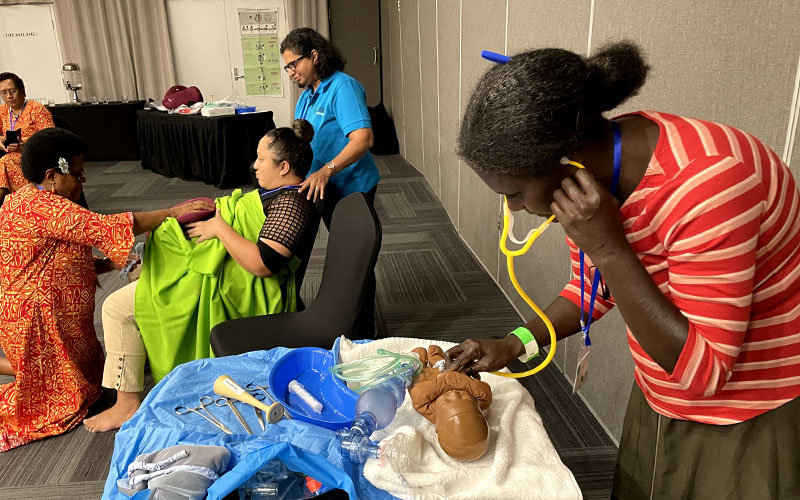 (Image: healthcare workers participating in clinical simulation training session)
(Image: healthcare workers participating in clinical simulation training session)The Pacific Simulation for Midwifery Innovation Learning and Education (SMILE) project supports six Pacific Island countries to provide high-quality midwifery care and improve the wellbeing of mothers and newborns.
Led by Burnet Institute’s midwifery team, the project works closely with education providers in Samoa, Tonga, Fiji, the Solomon Islands, Vanuatu, and Kiribati to ensure midwifery teachers have the confidence to use simulation throughout their education programs.
Clinical simulation replicates real-life scenarios, allowing students to build confidence and competence in their clinical skills before working in real-world settings. This hands-on approach is valuable in their decision making and emergency-response skills.
The project launched with a pilot at the National University of Samoa in 2024 as a collaboration between local education institutions, governments, and non-government organisations.
Burnet midwifery specialist Erin Ryan said this included setting up simulation learning spaces and assisting local midwives to build their capacity.
“Most countries lack basic simulation equipment, and even if they have the equipment, they're often not prepared or supported to use it effectively in their teaching,” Ms Ryan said.
“We purchased and shipped climate-appropriate equipment to support midwifery educators to develop simulation scenarios that will be context-specific for their country.”
More than 75 midwives attended from eight countries, spending three days working directly with the simulation equipment.
“People were curious about the equipment and interested in learning how to integrate simulation into education. We hope this will be the first of many conferences,” Ms Ryan said.
This year, the Burnet team will visit each of the seven midwifery schools in the Pacific to continue to support the implementation of simulation labs and ensure the labs are being used effectively in the long term.
Burnet midwifery specialist Rachel Smith said midwives played a critical role in providing safe and evidenced-based care for sexual, reproductive, maternal, newborn, child and adolescent health.
“When regulated to global standards, midwives can provide comprehensive and culturally-sensitive community-based care,” she said.
By strengthening midwifery education, the Pacific SMILE project aims to continue improving maternal and newborn healthcare, ensuring better outcomes for all families across the Pacific.
